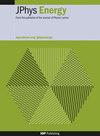Introduction of novel method of cyclic self-heating for the experimental quantification of the efficiency of caloric materials shown for LaFe11,4Mn0,35Si1,26Hx
IF 6.3
3区 材料科学
Q1 ENERGY & FUELS
引用次数: 0
Abstract
Hysteresis and the associated production of dissipative heat during first order phase transitions are often major contributors to thermodynamic losses in caloric heat pumps. The figure of merit (FOM), defined as the ratio of adiabatic temperature change and the thermal hysteresis of the caloric material, quantifies these losses, and can also be used to calculate the maximum potential efficiency of a caloric material in a thermodynamic cycle. This paper presents a novel and simple method to determine the heat loss and thus the FOM can be determined from self-heating of the caloric material during repeated field cycling. As this method mainly requires temperature readings and the ability to cycle the caloric material in a field, most test setups that directly measure the adiabatic temperature change should already be able to perform dissipative heat measurements with this technique. With the presented method, we were able to determine the efficiency of a commercial LaFeSiMnH-sample with a high degree of accuracy. A maximum FOM of was determined for the selected LaFeSiMnH-sample. In an ideal cascaded magneto caloric system, this corresponds to a system efficiency of 90%, with an ideal heat regeneration this could theoretically even be increased to 97%.引入新的循环自热方法,对 LaFe11,4Mn0,35Si1,26Hx 热量材料的效率进行实验定量
在一阶相变过程中产生的滞后和相关散热通常是热量泵热力学损失的主要原因。优点系数(FOM)的定义是绝热温度变化与热量材料热滞后的比值,它可以量化这些损失,也可用于计算热量材料在热力学循环中的最大潜在效率。本文提出了一种新颖而简单的方法来确定热量损失,从而可以通过热量材料在反复现场循环过程中的自热来确定 FOM。由于这种方法主要需要温度读数和在现场循环发热材料的能力,大多数直接测量绝热温度变化的测试装置应该已经能够利用这种技术进行耗散热测量。利用所介绍的方法,我们能够高精度地确定商用 LaFeSiMnH 样品的效率。所选 LaFeSiMnH 样品的最大 FOM 为。在理想的级联磁致热系统中,这相当于 90% 的系统效率,而在理想的热再生条件下,理论上这一效率甚至可以提高到 97%。
本文章由计算机程序翻译,如有差异,请以英文原文为准。
求助全文
约1分钟内获得全文
求助全文
来源期刊

Journal of Physics-Energy
Multiple-
CiteScore
10.90
自引率
1.40%
发文量
58
期刊介绍:
The Journal of Physics-Energy is an interdisciplinary and fully open-access publication dedicated to setting the agenda for the identification and dissemination of the most exciting and significant advancements in all realms of energy-related research. Committed to the principles of open science, JPhys Energy is designed to maximize the exchange of knowledge between both established and emerging communities, thereby fostering a collaborative and inclusive environment for the advancement of energy research.
 求助内容:
求助内容: 应助结果提醒方式:
应助结果提醒方式:


